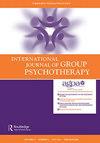团体治疗及药物滥用特刊简介
IF 1
4区 心理学
Q3 PSYCHOLOGY, CLINICAL
引用次数: 2
摘要
本期特刊的重点是药物滥用/成瘾的团体治疗。使用团体疗法治疗药物滥用者是一种时机成熟的方法。在过去的10-15年里,各种各样的小组方法在各种各样的环境中越来越多地用于这一目的。事实上,治疗这些通常难以治疗的患者的大多数专家都会同意,对大多数此类患者来说,团体治疗是治疗的选择。药物滥用/成瘾与药物使用不同,是一种慢性复发的脑部疾病,具有心理社会、行为和社会的前因后果(Leshner, 1997年)。随着对物质使用障碍的神经生物学的了解越来越多,对这些疾病的病因学和流行病学所涉及的社会心理因素的了解也越来越多,对最有效的治疗方法的了解也越来越多。尽管人们使用和滥用精神活性物质是为了感觉良好或感觉更好,但很明显,从事药物滥用(表型行为)是遗传倾向(基因型)、某些社会心理环境风险因素和药物本身的精神药理学作用之间相互作用的结果。为了避免药物对大脑的不良病理生理作用及其对个人、家庭和社会层面行为的不良影响,有效的预防和治疗干预是必要的。由于药物滥用行为的发展发生在各种群体中(家庭、学校、同伴群体等),因此在治疗组中关注群体的使用是适当的本文章由计算机程序翻译,如有差异,请以英文原文为准。
Introduction to the Special Issue on Group Therapy and Substance Abuse
This special issue focuses on the group therapy of substance abuse/addiction. The use of group therapy for the treatment of substance abusers is a method whose time has come. Over the past 10–15 years, a variety of kinds of group approaches has increasingly come into use for this purpose in a wide variety of settings. Indeed, most specialists in the treatment of these often difficult-to-treat patients would agree that for most such patients, group treatment is the treatment of choice. Substance abuse/addiction, as distinct from substance use, is a chronic relapsing disease of the brain with psychosocial, behavioral, and societal antecedents and consequences (Leshner, 1997). As more has been learned about the neurobiology of the substance use disorders, and there is an increased understanding of the psychosocial factors involved in the etiology and epidemiology of these disorders, there also has been an enhanced understanding of the most effective methods of treatment. Although people use and abuse psychoactive substances of abuse to either feel good or feel better, it has become clear that engaging in substance abuse (the phenotypical behavior) is the result of interactions among genetic predispositions (the genotype), certain psychosocial environmental risk factors, and the psychopharmacological effects of the substances themselves. To avoid the adverse pathophysiological effects of drugs on the brain and their adverse effects on behavior at individual, familial, and societal levels, effective prevention and treatment interventions are necessary. Because the development of substance-abusing behavior takes place in a variety of groups (family, school, peer groups, and the like), it is appropriate to look to the use of groups in treatment set-
求助全文
通过发布文献求助,成功后即可免费获取论文全文。
去求助
来源期刊

International Journal of Group Psychotherapy
PSYCHOLOGY, CLINICAL-
CiteScore
2.30
自引率
7.70%
发文量
16
期刊介绍:
Recognized as the leading source of information on group therapy theory, practice, and research, this journal features contributions from foremost experts in the field. International Journal of Group Psychotherapy offers: - Clinical articles on group treatment models, process issues, and techniques - Research reviews that keep practitioners up to date - Thought-provoking essays in the Reader"s Forum and Commentary sections - Reviews of current books and video releases - Special issues on such topics as evidence-based practice and ethics
 求助内容:
求助内容: 应助结果提醒方式:
应助结果提醒方式:


